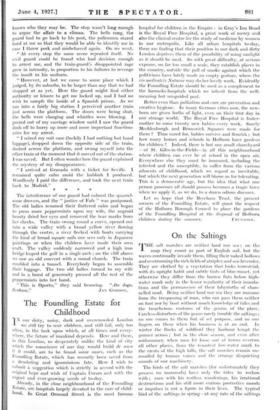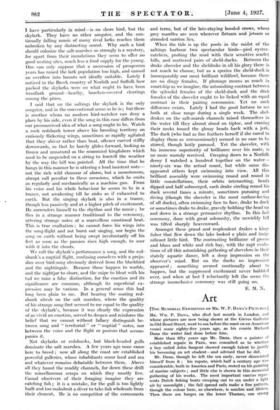On the Saltings
TilE salt marshes arc neither land nor sea ; on the map they count as part of English - soil, but 'the waves continually invade them, filling their naked hollows and overrunning the rich fields of atriplex and sea-lavender. They are clothed by a vegetation that looks terrestrial, with its upright habit and subtle tints of blue-russet, yet otherwise they differ from the barren flats below high- water mark only in the lesser regularity of their inunda- tions and the permanence of their labyrinths of chan- nelled mud. Being neither land nor sea they are immune from the trespassing of man, who can pass them neither on foot nor by boat without much knowledge of tides and the treacherous customs of the genius of the place. Careless disturbers of the peace rarely trouble the saltings ; no one comes to them but of set purpose, and no one lingers on them when his business is at an end. In winter the flocks of wildfowl they harbour tempt the gunner across ; but in the close season, and even after midsummer, when men let loose out of towns overrun all other places, from the remotest low-water mark to the -crests of the high hills, the salt marshes remain un- assailed by human voices and the strange disquieting sounds of our machinery.
The birds of the salt marshes (for unfortunately they possess- no mammals) have only the tides to reckon with ; man with his restless wanderings, his irrational destructions and his still more curious protective moods or impulses -is not a figure in their lives. The typical bird of the saltings in Springat any rate of the sittings I have -particularly in mind—is no shore bird, but the skylark. They have no other songster, and the con- tinually falling music of many rival larks reaches them unbroken by any distracting sound. Why such a bird should colonize the salt-marshes so strongly is a mystery, for apart from their inundations they seem to offer no good nesting sites, much less a food supply for the young. One can only suppose that a succession of prosperous years has raised the lark population too high, and caused an overflow into haunts not ideally suitable. Lately I noticed in the Breek country of Norfolk and Suffolk how packed the skylarks were on what ought to have been woodlark ground—heathy, bracken-covered clearings among the pines.
I said that on the saltings the skylark is the only songster, and in the conventional sense so he is ; but there is another whom no modern bird-watcher can deny a place by his side, even if the song in this case differs from our preconceived idea of what a song ought to be. Watch a cock redshank tower above his breeding territory on curiously flickering wings, sometimes so rapidly agitated that they shiver rather than beat, oftener curved stiffly downwards, so that he barely glides forward, looking as frozen and unnatural as the mummied kingfishers which used to be suspended on a string to foretell the weather by the way the bill was pointed. All the time that he hangs in this manner he is uttering a loud insistent note— not the rich wild clamour of alarm, but a monotonous, abrupt call peculiar to these occasions, which he emits as regularly and mechanically as a machine gun. From his voice and his whole behaviour he seems to be in a trance, not awakening till he sinks as if exhausted to earth. But the singing skylark is also in a trance, though less passively and at a higher pitch of excitement. He surrenders himself to the rhythm and the music ; he flies in a strange manner traditional to the ceremony, uttering strange notes at a marvellous emotional heat. This is true exaltation ; he cannot force his wings into the song-flight and not burst out singing, nor begin the song on earth without being swept involuntarily off his feet as soon as the passion rises high enough, to soar with it into the clouds.
We call the skylark's performance a song, and the red- shank's a nuptial flight, confusing ourselves with a preju- dice over bird-song obviously derived from the blackbird and the nightingale. Because those happen to warble, and the nightjar to churr, and the snipe to bleat with his tail we raise a false distinction, for the emotion and its significance are common, although its superficial ex- pression may be various. In a general sense this had long been plain to me. But hearing the soaring red- shank afresh on the salt marshes, where the quality of his strange song first seemed to me equal to the quality of the skylark's, because it was clearly the expression of as vivid an emotion, served to deepen and reinforce the belief that we cannot without fallacy distinguish be- tween song and " territorial." or " nuptial " notes, nor between the voice and the flight or posture that accom- panies it.
Not skylarks or redshanks, but black-headed gulls dominate the salt marshes. A few years ago none came here to breed ; now all along the coast are established powerful gulleries, whose inhabitants scour land and sea and whatever remains debatable between them. Above all they haunt the muddy channels, for down these drift the miscellaneous scraps on which they mostly live.
Casual observers of their foraging imagine they are catching fish ; it is a mistake, for the gull is too lightly built and too maladroit a diver to take fish wholesale from • their element. He is no competitor of the cormorants and terns, but of the late-staying hooded crows, whose grey mantles are seen wherever flotsam and jetsam or stranded carrion lies.
When the tide is up the pools in the midst of the saltings harbour two spectacular birds—pied oyster- catchers, probing the mud with their sensitive scarlet bills, and scattered pairs of sheld-ducks. Between the drake shoveler and the sheldrake in all his glory there is not much to choose, but as a species the sheld-duck is incomparably our most brilliant wildfowl, because there are no dingy females. If plumage means as much in courtship as we imagine, the astonishing contrast between the splendid females of the sheld-duck and the drab females of the shoveler ought to be linked with an equal contrast in their pairing ceremonies. Yet no such difference exists. Lately I had the good fortune to see both at close range during a single week. The shel- drakes on the salt-marsh channels raised themselves in the water till they almost stood on tiptoe, and craning their necks tossed the glossy heads back with a jerk. The duck (who had as fine feathers herself if she cared to display them as ceremoniously) seemed in no case to be stirred, though hotly pursued. Yet the shoveler, with his immense superiority of brilliance over his mate, is no more warmly received. Creeping down to a Norfolk decoy I watched a hundred together on the water— ninety-six was the actual count, but while some dis- appeared others kept swimming into view. All this brilliant assembly were swimming round and round in little constellations, their orbits intersecting, heads dipped and half submerged, each drake circling round his duck several times a minute, sometimes pursuing and diving (though the shoveler is the most surface-loving of all ducks), often swimming face to face, drake to duck or sometimes drake to drake, gravely bobbing the head up and down in a strange persuasive rhythm. In this last ceremony, done with great solemnity, the unwieldy bill was tilted sharply heavenward.
Amongst these grand and resplendent drakes a king- fisher that flew down the lake looked a plain and insig- nificant little bird. The contrasting brilliance of greens and blues and white and rich bay, with the rapt evolu- tions of all this astonishing gathering of shovelers in their stately aquatic dance, left a deep impression on the observer's mind. But on the ducks no impression appeared ; something seemed continually about to happen, but the suppressed excitement never bubbled over, and when at last 'I reluctantly left the scene the strange inconclusive ceremony was still going on.
E. M. N.







































 Previous page
Previous page